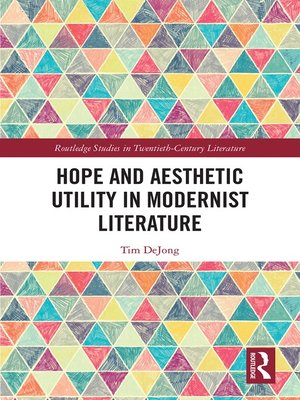Hope and Aesthetic Utility in Modernist Literature
ebook ∣ Routledge Studies in Twentieth-Century Literature
By Tim DeJong

Sign up to save your library
With an OverDrive account, you can save your favorite libraries for at-a-glance information about availability. Find out more about OverDrive accounts.
Find this title in Libby, the library reading app by OverDrive.



Search for a digital library with this title
Title found at these libraries:
| Library Name | Distance |
|---|---|
| Loading... |
"Hope" and "modernism" are two words that are not commonly linked. Moving from much-discussed negative affects to positive forms of feeling, Hope and Aesthetic Utility in Modernist Literature argues that they should be. This book contends that much of modernist writing and thought reveals a deeply held confidence about the future, one premised on the social power of art itself. In chapters ranging across a diverse array of canonical writers – Henry James, D.W. Griffith, H.D., Melvin Tolson, and Samuel Beckett – this text locates in their works an optimism linked by a common faith in the necessity of artistic practice for cultural survival. In this way, the famously self-attentive nature of modernism becomes a means, for its central thinkers and artists, of reflecting on what DeJong calls aesthetic utility: the unpredictable, ungovernable capacity of the work of art to shape the future even while envisioning it.







